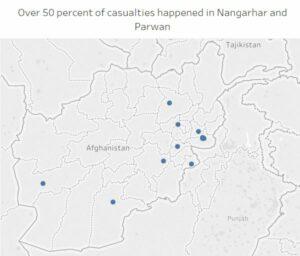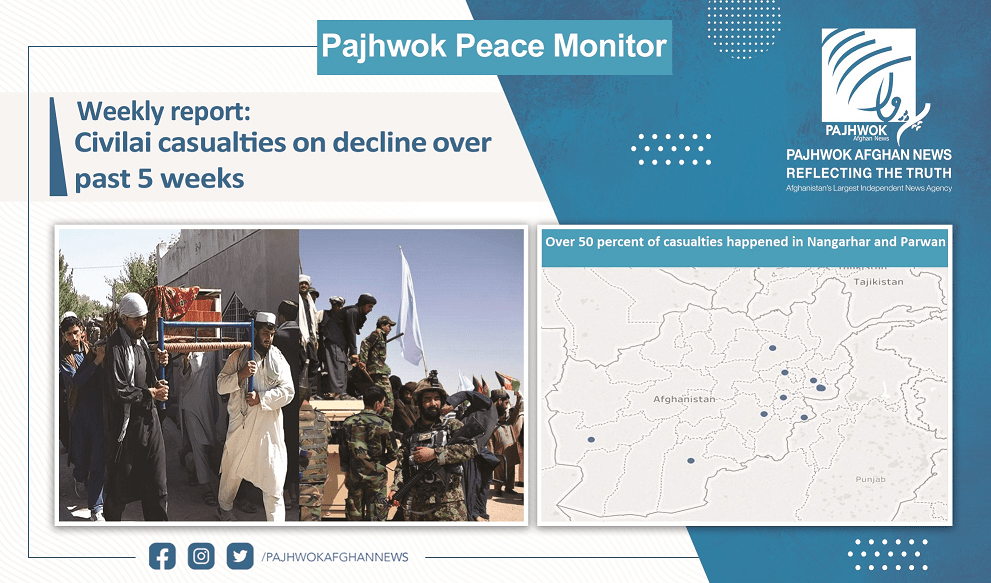KABUL (Pajhwok): Civilian casualty figures have been on the decline over the past five weeks despite Taliban’s increasing armed aggression and capturing of more districts.
- Some countries worried about High Council for National Reconciliation (HCNR) future
- US forces leave Bagram Airbase amid Taliban intensified attacks on districts
- Attacks question mark on Taliban’s willingness to negotiated settlement: Pentagon
- Afghan government and Taliban blame each other for delay in intra-Afghan talks
- Pakistan and Uzbekistan urge negotiated settlement to Afghan conflict
Attack, civilian casualties:
Fourteen civilians were killed and 49 others injured in 12 attacks in Nangarhar, Parwan, Baghlan, Farah, Ghazni, Khost and Logar provinces during the past one week.

Despite the Taliban growing attacks to capture more districts last week, civilian casualties declined comparing to the previous week.
In these attacks, security forces and the Taliban also suffered casualties but Pajhwok did not publish the figures because enough information with authentic sources was not available to support casualty figures.
Security institutions claimed inflicting thousands of casualties on the Taliban in past one month but the Taliban rejected government’s claim and counterclaimed that a large number of Afghan security forces had been killed and injured.
Concerns over security situation:
HCNR Chairman Dr. Abdullah Abdullah last week said the Taliban had intensified the conflict when foreign forces were leaving Afghanistan. The conflict has reached close to the gates of Kabul and the survival of the republic of Afghanistan is faced with danger.
Tajikistan, Kazakhstan, Kyrgyzstan, Armenia, Russia, Serbia, Afghanistan and Belarus parliament leaders during a gathering termed the Taliban resurgence in the northern part of Afghanistan as dangerous for the region and urged the Taliban to come to the table of negotiations.
NATO Forces Commander in Afghanistan Gen. Miller said there is possibility of the danger that Afghanistan may fall into a civil war soon after the withdrawal of foreign forces. If Afghanistan’s leaders did not unite, they may face more dangerous situation.
This comes as common people in some parts of the country took arms against the Taliban after the Taliban overran some districts. The Taliban warned of harsh response to local uprising armed personnel.
Russian Ambassador in Kabul said that Moscow did not feel direct threat from the Taliban but added the situation in Afghanistan was worrying. Threat of terrorism has increased.
US forces pull out of Bagram Airbase
On Friday, the US forces left their epicenter of war the Bagram Airbase, indicating that the withdrawal of all foreign forces is near. US and NATO forces are expected to leave Afghanistan by September 11 this year.
But US State Department had said that around 600 US forces will stay in Afghanistan to ensure the security of Kabul’s Green Zone, Kabul Airport and US diplomatic mission.
According to the source, these forces will not have the right to conduct military raids but when attacked, they could defend themselves.
Who to be blamed for stalemate in intra-Afghan talks
The Taliban’s Doha Office Spokesperson Dr. Naeem said that most members of the other side (Islamic Republic) were not present in Doha therefore there was not progress in peace talks.
Few days earlier, Afghan negotiating team member and Jamiat Islami leader Atta Mohammad Noor’s son Khalid Noor took arm and fought alongside his father in Balkh.
But Afghan government negotiating team said that their team was present in Doha with full strength.
Afghanistan’s National Security Advisor HamdullahMohibsaid the Taliban should have entered ceasefire soon after Doha Agreement, but they increased violence and fighting. He said the Taliban showed the world that they want power through force.
US Defence Department also said the Taliban attacks raised questions over their commitment to negotiated settlement of the conflict.
The Taliban increased violence in Afghanistan recently, according to some reports the Taliban overran nearly 120 districts in the past two months.
This comes as Pakistan, Uzbekistan and Afghan HCNR Chairman Abdullah stressed over negotiated settlement of the conflict as military solution had failed.
People, political parties
Last week, a large number of local people during a gathering in Paktia province announced to fight against the Taliban. In addition, Jamiat-e-Islami Leader Atta Mohammad Noor appointed head of the national recruitment force to fight the Taliban in Balkh.
Members of political patties — MelliGhorzang, WahdatIslami, HarakatIslami Azad, WahdatIslamiNawin, Hizb-e-Islami led by Hamdard, HarakatIslami, EqtedarMelli, EtedalMelli, Political Parties Consulatation Council and members of Jamiat-e-Islami participated in the meeting.
Some Balkh residents in a separate gathering asked government forces and the Taliban to ensure the security and safety of common people and their properties.
They said civilians suffered as a result of airstrikes and bomb blasts in some areas recently.
In Paktia, hundreds of people in a gathering stressed over sincere efforts for peace and demanded the international community play its role in ending the ongoing war.
Hundreds of people from Kandahar, Zabul, Uruzgan and Helmand held a gathering in Kandahar province and said if the Taliban did not stop war and reconcile, common people will take arms and fight against them.
nh








GET IN TOUCH
NEWSLETTER
SUGGEST A STORY
PAJHWOK MOBILE APP